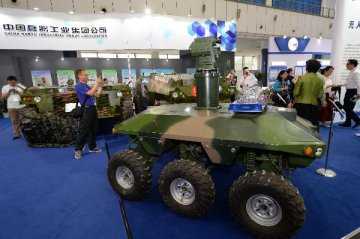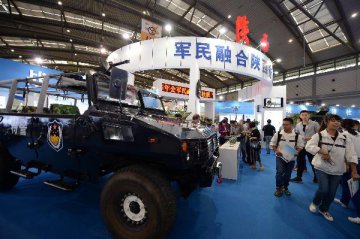
The mixed ownership reform has been deepening in recent years. Under the background of “military and civil integration”, private enterprises with R&D strength and large military engineering groups have joined hands. Among 61 listed companies with military and civil integration and the 2017 interim results released, 50 companies recorded profits while 11 recorded losses. As for the net profit and profit, they saw differentiated performances.
For private enterprises with military businesses, despite the surging valuation, those with bad performance have started to cut bubbles in the secondary market.
Jiangxi Huawu Brake Co., Ltd. (300095.SZ) announced on Sept. 1 that it proposed to acquire 20 to 25 percent equities of CNTEC. The company indicated that it is to lay foundations for the development of military engineering informatization, commercial space and other high-tech industries in the future.
As a matter of fact, the cooperation between private enterprises and military engineering enterprises have been conducted since the “military and civil integration” was lifted as a national development strategy in 2015. Competitive private enterprises have participated in the integration through M&As, the expansion of military businesses and the establishment of military engineering industrial funds.
Many private enterprises participated in military engineering to make progresses in financing and industrial upgrading. Insiders indicated that private enterprises currently participate in military engineering through M&As, the expansion of military businesses and the establishment of military engineering industrial funds.
Take Sunbird Yacht Co., Ltd. (300123.SZ) as an example, the company was conditionally approved by China Securities Regulatory Commission (CSRC) to acquire Chengdu Yaguang Electronics Co., Ltd. to expand its business into the military engineering according to the announcement made on July 20, 2017. The company will acquire 97.38 percent equities of Yaguang Electronics by issuing shares and it will also raise no more than 1,066 million yuan for the investment programs of Yaguang Electronics, including the establishment of a new technology R&D center. Military electronics will be the second principal business of the company after the completion of the acquisition.
Unlike Sunbird Yacht’s direct participation in M&As and the expansion of military products, Beijing Transtrue Technology Inc. (002771.SZ) announced on Aug. 3 that it will establish an industrial investment fund on military and civil integration with Hunan Xiangjiang Liyuan Investment Management Co., Ltd. to expand the investment in industries including the civil and military integration.
A researcher on machinery industry with a securities company in southern region indicated on Sept. 1 that there are various quality assets to be developed by domestic military enterprises. With the capital strength of listed companies, they can solve the huge pressure on military engineering assets securitization.
Listed companies with military businesses saw differentiated performance. The net profits attributable to the shareholders of listed companies saw a gap of over 600 million yuan.
The statistics of Choice show that among 61 listed companies with military and civil integration and the 2017 interim results released, 50 companies recorded profits while 11 recorded losses. China Shipbuilding Industry Group Power Co., Ltd. (600482.SH) recorded a net profit attributable to the shareholders of listed companies of 561 million yuan while Tsinghua Tongfang Co., Ltd. (600100.SH) recorded a loss of 121 million yuan. Different companies saw diversified profit growth. Guangdong Hongda Blasting Co., Ltd. (002683.SZ) recorded a year-on-year increase of 1,902.37 percent in the net profit attributable to the shareholders of listed companies while Jiangsu Dagang Co., Ltd. (002077.SZ) witnessed a decrease of 240.52 percent year on year.
“For private enterprises participated in military and civil integration, the troops have relatively fixed but not unique procurement channels. As private enterprises can only participate in limited military businesses, leading enterprises will become stronger in the industry.” A public fund manager on SOEs reform in southern China indicated on Sept. 1 that for private enterprises participated in military and civil integration to seek scaled production and maximum benefits, they may lose their competitiveness due to the shortage of orders. Companies with good performance are raising the barriers for core technologies and advancing towards high-end military products to reduce risks and keep growth.
Hongda Blasting developed aerospace power technologies through acquiring equities of Hunan Hongda Risheng in the first half of 2017. The statistics of Choice show that the military and civil integration achieved operation revenue of 18,624,300 yuan in the first half of 2017, representing an increase of 169.5 percent year on year. The net profit attributable to the shareholders of listed companies saw an increase of 1,902.37 percent year on year.
Based on the valuation of Shenwan & Hongyuan Securities on the following industries in the first half, the valuation of aerospace, space, land equipment, radar industrial chains, photoelectric devices, electro-communication, ancillary equipment and services, aircraft engine and BSD industrial chains is 70 times, 62 times, 84 times, 69 times, 163 times, 38 times, 64 times, 91 times and 123 times, respectively. It can been seen that many private enterprises participated in military businesses.
Besides the outstanding performance of listed military engineering companies contributed by the military and civil integration, the mixed ownership reform is another highlight of the military engineering industries in the second half. The asset securitization will be the key in this round of mixed ownership reform of central enterprises. In the military engineering industry, China Shipbuilding Industry Corporation proposed assets securitization as a key means in the mixed ownership reform. In addition, it also advances assets securitization in different sectors to build professional platforms for capitals operation.
“Focusing on principal businesses with competitive industries as pioneers, this round of mixed ownership reform is also characterized by employee shareholding programs,” An insider from a central enterprise indicated. It is learnt that China Aerospace Science and Technology Corporation mainly advances the mixed ownership reform in private sectors. The Aviation Industry Corporation of China (AVIC) focuses on the development of main businesses and gradually open components and general supporting industries. China South Industries Group Corporation (CSGC) prepared the preliminary plan on the pilot on the mixed ownership reform and set four companies to conduct the pilot. It also conducts the pilot on shareholding by medium and senior management in Chongqing Changan Automobile Company Limited (000625.SZ), a listed company under it.
Translated by Star Zhang























Latest comments